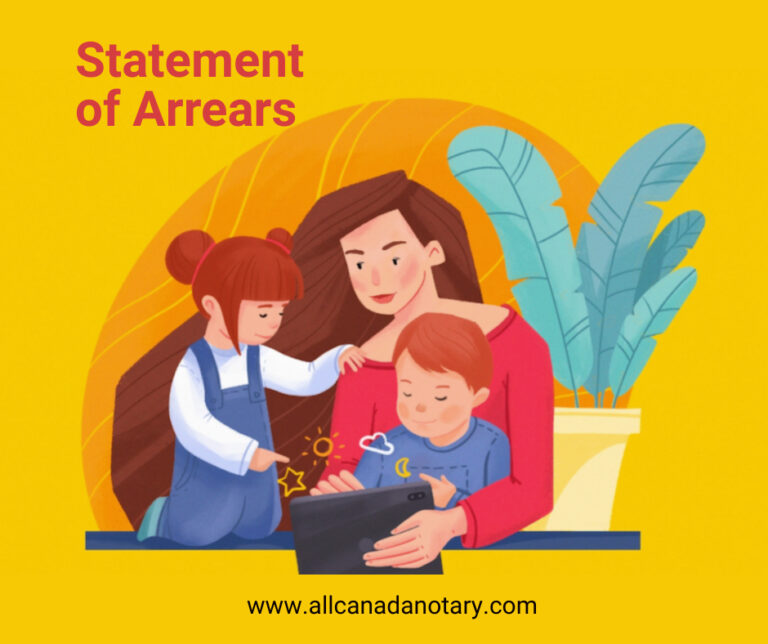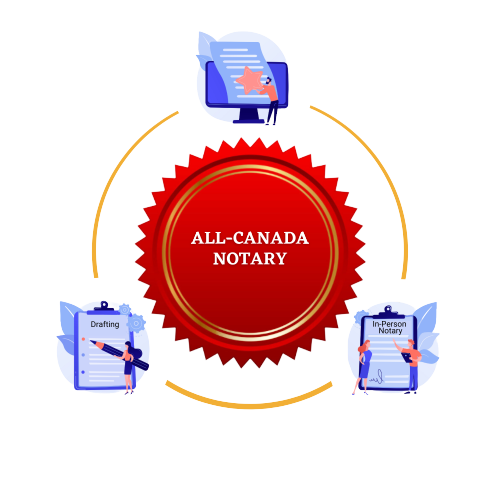
What is a Statement of Arrears?
A statement of Arrears is a document showing or detailing an overdue payment or payment missed by a payor. The essence of the Statement of Arrears is to enable FRO to begin the process of collecting the unpaid support payments. The completed Statement of Arrears must be signed before a notary public. All-Canada Notary can help you commission your statement of arrears in one of our offices near you or you can use our online notarial services.
If you are a divorcee and the court has issued a support order and a support deduction order for a payor to pay you or your child support payments, save for the fact that the Family Responsibility Office (FRO) receives support orders automatically, it is the authority to consult where the payor defaults. The FRO is a federal organization that handles child and spousal support. The FRO collects support payments directly from the person who is responsible for paying support, keeps track of the payments, and then distributes the funds to the person who is responsible for receiving support.
What to do if you have not received your support payment
If you are a support recipient and have not received your payment on time the best option is to contact FRO. The FRO can tell you if the payment was made and was just delayed in reaching you, or whether the payor is behind on their payments. If the payor is behind on their payments, you’ll need to fill out a Statement of Arrears and send it to the FRO. You can also include any support the payor owes you from before the support order was recorded with FRO in the Statement of Arrears.
Information that must be completed in a Statement of Arrears
The following information must be completed in a statement of arrears:
- Support recipient’s name;
- Payor’s name;
- Order (Court’s Order, dated, Court and Court file number);
- Agreement filed with the court (date the court agreement was filed, and Court file number);
- Date payment was due;
- Amount due;
- Date paid;
- Arrears (total arrears and interest).
What can the FRO do?
The Family Responsibility Office can pursue one or more of the following steps to collect payment:
- Garnishee a payor’s wages or any government money received such as the Canada Pension Plan benefits, employment insurance, income tax refunds, worker’s compensation, or old age security benefits;
- Garnishee a payor’s bank accounts or garnishee 50% of an account the payor holds jointly;
- Suspend the payor’s driver’s license;
- Report the payor to a credit bureau;
- Suspend the payor’s passport;
- Suspend any federal license, such as a pilot’s license;
- Register a lien against the payor’s personal property;
- Issue a writ for seizure and sale of any property;
- Report the payor to any occupational or professional organizations to which the payor belongs;
- Seize lottery winnings;
- Start a default hearing; and/or
- Make an order against anyone who is helping the payor hide income.
If the FRO cannot enforce payment using any of these mechanisms, it can have the defaulting payor brought back to court and found in contempt of the support order.
How can All-Canada Notary help you?
Your completed Statement of Arrears needs to be notarized before submitting it to the Family Responsibility Office (FRO) to claim arrears for support payments owed by a payor. All-Canada Notary can help you notarize your Statement of Arrears in the comfort of your home or office.
All-Canada Notary operates both physical and virtual/online notary services.

